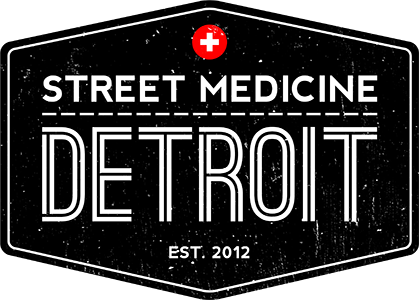This morning, I had the good fortune of practicing medicine in a homeless shelter with Street Medicine Detroit. SMD is a student run organization at Wayne State University School of Medicine that ventures out into the community and provides compassionate medical care to the underserved and homeless of Detroit. Because of the cold weather in Michigan, our "street run" took place inside a church just off of Trumbull street on the west side of Detroit. This church serves as a place of respite for homeless men and women, a space where they can see the news of the day on TV for the first few hours of the morning and have a quiet time of reflection for the remainder of the morning.
On this day, our street team of six medical students and one attending clinician offered our services to the group of roughly twenty people. Four people requested a full visit and a few more asked to have a few of their medically-related questions answered. As one of the team leaders, I was able to care for two patients - a middle aged man recovering from an attack of acute gouty arthritis and a young man with chest pain. The older man's knee pain and gouty flare was complicated by an inability to take colchicine because of renal impairment discovered when he was last hospitalized. His case was also challenging because of his high blood pressure that could have been related to his self-reported state of stress or his on-going knee pain. Whatever the cause, we were able to schedule a follow-up appointment at a local free clinic. The younger man's chest pain was found to be caused by a case of community acquired pneumonia, which was discovered after a thorough physical exam lead us to listen and compare his lung fields that revealed coarse crackling sounds on one side, or unilateral rales. Unfortunately, this case was also complicated, this time by GERD or gastric reflux, asthma, depression, and crack cocaine use.
Substance abuse is prevalent among the homeless population and has been described as a way to palliate the stress of homelessness itself - an interesting but vicious cycle. So our group offers only what the patients are ready/willing to take on. We offer medications if they are able to take them regularly, we counsel about risk reduction, and we attempt to set up follow-up appointments to see if our treatments are effective. We also build rapport - to practice street med, you have to have a certain amount of street cred - and the time we spend with these men and women and the compassion that we show does not go unnoticed. Word spreads quickly through the complex networks of support that holds the homeless community together, and we were told that we have earned a degree of trust and respect among those that we serve. It's been an honor to be there and I'm looking forward to the next opportunity.
Paul Thomas, MSIV
http://paulcthomas.weebly.com/1/post/2012/12/street-medicine-detroit.html

